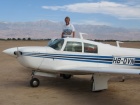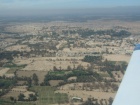|
It took us less than 20 minutes to fly to
Agadir, but we spent two hours at the airport there. Although we hadn’t
arrived from abroad, we still had to fill out the arrival forms twice. I
suspect the second policeman we met inside the terminal didn’t trust the
younger one, who came to meet us on the apron, to have done the job
properly.
The Agadir to Bamako (Mali) flight is going to be a long one, about 8
hours, so we decided to fill up with Avgas to save time on the day of
departure. Also, in spite of sending a fax to the civil aviation
authorities in Bamako over 2 weeks ago and getting their confirmation by
phone that it had been well received, we still hadn’t received their
authorization for overflying and landing in the country. We therefore
asked a rather reluctant official in the ‘bureau de piste’ to send a
reminder to the Mali authorities by AFTN. “Two lines only, please. I am
tired”, said the poor man who was suffering from lack of nourishment
during Ramadan.
Our destination for the day was the Souss Massa national park by the
coast about 40 kilometers south of Agadir. We had booked 3 nights at the
Ksar Massa Hotel. There wasn’t much room for negotiation with Abdul, our
taxi driver, as it would be a rough dirt track for the last 7
kilometres. Still, the whole trip took 1 hour 15 minutes, including a
stop for fuel and a prayer in the adjacent mosque, so I (Angela) was
ready to pay more than the 400 dirhams (about 40 euros) we’d agreed
upon. Flemming shook his head to my suggestion, and in spite of grimaces
from Abdul on the rough roads, he accepted the 400 dirhams gracefully
and asked us if we’d like him to pick us up for the return ride 3 days
later.
The Ksar Massa Hotel is in a spectacular setting above a wide, sweeping
beach with good waves for surfers and stunning sunsets. Unfortunately
there is a long line of mostly plastic rubbish at the high tide mark,
not visible from the hotel grounds. The next morning we went bird
spotting with the chief guide in the area, Radouin. He told us the local
school is trying to educate the children to care for their environment
and they ‘regularly’ go and pick up all the rubbish.
The main attraction of the Souss Massa national park is the rare bald
ibis, which is increasing in numbers again thanks to the protection
provided by the reserve and now number about 400 in total. Like men, the
birds become balder with age. Before sunset our first evening Flemming
saw a whole flock of them flying in a ‘V’ formation, so that each bird
could take advantage of the lift provided by the preceding one.
Radouin took us to a nearby lagoon where we saw several species of birds
such as pink flamingos, glossy ibis, spoonbills, cormorants, egrets,
coots, marbled duck, grey herons and black-winged stilts. Radouin also
pointed out some mongoose tracks and, with the help of the binoculars
and telescope, we spotted some wild boar on the other side of the
lagoon. And, at the end of our walk, Radouin found a large number of
bald ibis for us, pecking about in the sand for food not far from the
hotel.
After several unsuccessful attempts to reach the Mali civil aviation
authorities over the Iridium phone, Flemming finally managed to get
through. Monsieur Chulibaly gave him a clearance number, so we can relax
and enjoy the rest of our stay here!
Just before sunset, we went for a walk to the local launching ramp for
the fishing boats. The fishermen have set up home in caves in the cliff
face, rather like the Dogon people in Mali whom we plan to see in a few
days.
We also met an interesting French ornithologist Claude from Bordeaux
who, thanks to a French-Moroccan collaboration, comes here regularly to
study the health and population of the rare bald ibises. He told us that
the only other place in the world where they exist is in Syria, where
they have two couples. He told us that he estimates the current
population of bald ibises at close to 500. This sounds like a lot, but
as a total global population this is very, very close to extinction.
Construction work is in progress here to provide more than 600 beds for
tourists, more than the total worldwide population of bald ibises. Let
us just hope that they survive the invasion. |

No departure hassle at Taroudant airstrip
|

Taroudant
|



